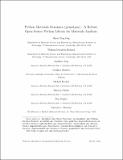Python Materials Genomics (pymatgen): A robust, open-source python library for materials analysis
Author(s)
Ong, Shyue Ping; Richards, William Davidson; Jain, Anubhav; Hautier, Geoffroy; Kocher, Michael; Cholia, Shreyas; Gunter, Dan; Chevrier, Vincent L.; Persson, Kristin A.; Ceder, Gerbrand; ... Show more Show less
Downloadpymatgen_with_bbl.pdf (1.694Mb)
PUBLISHER_CC
Publisher with Creative Commons License
Creative Commons Attribution
Terms of use
Metadata
Show full item recordAbstract
We present the Python Materials Genomics (pymatgen) library, a robust, open-source Python library for materials analysis. A key enabler in high-throughput computational materials science efforts is a robust set of software tools to perform initial setup for the calculations (e.g., generation of structures and necessary input files) and post-calculation analysis to derive useful material properties from raw calculated data. The pymatgen library aims to meet these needs by (1) defining core Python objects for materials data representation, (2) providing a well-tested set of structure and thermodynamic analyses relevant to many applications, and (3) establishing an open platform for researchers to collaboratively develop sophisticated analyses of materials data obtained both from first principles calculations and experiments. The pymatgen library also provides convenient tools to obtain useful materials data via the Materials Project’s REpresentational State Transfer (REST) Application Programming Interface (API). As an example, using pymatgen’s interface to the Materials Project’s RESTful API and phasediagram package, we demonstrate how the phase and electrochemical stability of a recently synthesized material, Li[subscript 4]SnS[subscript 4], can be analyzed using a minimum of computing resources. We find that Li[subscript 4]SnS[subscript 4] is a stable phase in the Li–Sn–S phase diagram (consistent with the fact that it can be synthesized), but the narrow range of lithium chemical potentials for which it is predicted to be stable would suggest that it is not intrinsically stable against typical electrodes used in lithium-ion batteries.
Date issued
2012-12Department
Massachusetts Institute of Technology. Department of Materials Science and EngineeringJournal
Computational Materials Science
Publisher
Elsevier
Citation
Ong, Shyue Ping, William Davidson Richards, Anubhav Jain, Geoffroy Hautier, Michael Kocher, Shreyas Cholia, Dan Gunter, Vincent L. Chevrier, Kristin A. Persson, and Gerbrand Ceder. “Python Materials Genomics (pymatgen): A Robust, Open-Source Python Library for Materials Analysis.” Computational Materials Science 68 (February 2013): 314–319.
Version: Author's final manuscript
ISSN
09270256